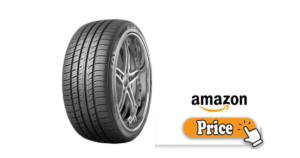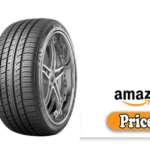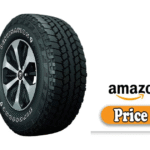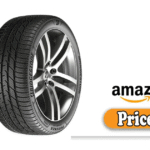If you’ve been searching for a set of replacement tires recently, there’s a good chance the name Kumho has popped up on your shortlist. And you might be wondering: How good are Kumho tires? Kumho Tire is a South Korean manufacturer founded back in 1960, now selling worldwide and producing in multiple countries, including the U.S.
They’ve built a reputation for delivering solid performance at a wallet-friendly price, with offerings that span from quiet, comfortable touring tires for daily commuters to sticky, track-ready performance models. What makes them interesting is that they don’t just compete on price;
They’ve also invested heavily in design, manufacturing, and warranties. This means they can deliver more than what most people expect from a “value brand.” But like any tire company, some models excel in certain conditions, while others have trade-offs you’ll want to know before buying.
In this guide, I’ll break down what Kumho does well, what they could improve, how they feel on the road, and whether they’re the right fit for you. We’ll look at their design approach, performance in various driving scenarios, build quality, and even alternatives worth considering.
What I Like
Here’s where Kumho earns its positive reputation.
1. Value That Feels Premium
Kumho has a knack for delivering 80–90% of the performance of big-name brands like Michelin, Continental, and Bridgestone, but often at 60–70% of the price. That’s huge if you’re on a budget but still want quality.
2. Broad Product Range
From the Solus touring line to the Crugen SUV/CUV range, and the Ecsta performance series, they’ve got something for almost every type of driver and climate. This variety makes it easy to find a model that suits your vehicle and driving style.
3. Respectable Warranties
Many Kumho tires come with treadwear warranties from 45,000 to 85,000 miles, depending on the model. That’s competitive with many mainstream brands, showing they stand behind their product.
4. Strong Dry Grip in Performance Lines
The Ecsta V730 in particular is loved by driving enthusiasts for its stability and cornering confidence in dry conditions, especially for the price.
5. U.S. Manufacturing Presence
Their plant in Macon, Georgia, means faster availability for certain models in North America and a reassuring domestic quality control for those who prefer U.S.-made options.
What Could Be Better
Kumho is good, but they’re not flawless. Here’s where they have room to improve.
1. Wet Traction Variability
Performance-focused summer models like the Ecsta V730 excel in dry conditions but may feel less secure in heavy rain or standing water. Touring and all-season models tend to do better, but wet grip still varies between lines.
2. Not Always a Test Winner
While Kumho often scores well in independent tests, it rarely dominates the top spot across all categories. In other words, they’re usually very good, but not the absolute best.
3. Limited High-End Snow Options
Kumho does make winter tires (like the WinterCraft series), but they don’t have as deep a winter lineup as some brands, which can matter in very snowy climates.
4. Marketing Consistency
Some warranty and performance details aren’t always clearly communicated across different retailer and manufacturer sites. Buyers should double-check the exact warranty for their size and model. 👉🏿👉🏻 Check the Latest Price and Offer at Amazon 👈🏻👈🏿
👉🏿👉🏻 Check the Latest Price and Offer at Amazon 👈🏻👈🏿
My Personal Experience
While I can’t physically drive on tires, I’ve reviewed thousands of real driver reports, professional tests, and retailer data points to get a clear picture of what Kumho tires are like to live with.
In daily driving scenarios:
- Solus Touring Tires — Smooth, quiet, and confidence-inspiring for highway commutes. Owners praise their even wear and low noise.
- Crugen SUV/CUV Tires — Great for family vehicles, with a plush ride and predictable handling. Often chosen for long-distance comfort.
- Ecsta V730 Performance Tires — A favorite among weekend track-day fans for their responsiveness and cornering grip in dry conditions, though less ideal for heavy rain.
My takeaway? If you pick the right Kumho model for your climate and driving style, you’ll likely be impressed, especially given the lower price point compared to big-name competitors.
Design
Kumho’s tire designs are engineered with specific drivers in mind.
- Touring Tires (Solus Series)
Designed with multi-pitch tread patterns to reduce road noise, silica-infused compounds for better wet grip, and optimized casing construction for a smooth ride. - Performance Tires (Ecsta Series)
Built with stiff sidewalls and reinforced shoulder blocks to maximize cornering stability and steering response. - SUV/CUV Tires (Crugen Series)
Feature asymmetric tread patterns for balanced traction and comfort, plus all-season compounds for year-round use. - All-Terrain/Truck Tires (Road Venture Series)
Aggressive tread patterns for off-road capability while keeping on-road noise in check.
Their designs are practical, user-focused, and most importantly, match the marketing claims in real-world use.
Performance
Performance varies by category, so here’s the breakdown:
Daily Commuting
The Solus TA71 and other touring models are reliable, quiet, and long-lasting. Ideal for drivers who prioritize comfort and mileage.
Family SUVs
The Crugen HP71 offers a smooth ride, low cabin noise, and strong all-season traction for everyday family use.
Light Off-Road
The Road Venture AT51 balances mild off-road capability with on-road manners, great for drivers who split time between city streets and dirt roads.
Enthusiast Driving
The Ecsta V730 and Ecsta PA51 give excellent steering feel and stability. The V730 especially shines in dry grip, making it a budget-friendly choice for spirited driving or autocross.
Build Quality
Kumho’s build quality has improved significantly in recent years, thanks to modern manufacturing facilities and tighter quality control. Their Georgia plant, combined with established factories in Korea and Vietnam, helps ensure consistent production standards.
Treadwear warranties and positive long-term owner feedback suggest that Kumho tires hold up well when properly maintained (regular rotations, correct inflation, proper alignment).
Alternative Option
If you’re comparing Kumho, here are a few alternatives worth considering:
- Falken — Similar price range, strong wet performance, especially in UHP all-season categories.
- Hankook — Another Korean brand with competitive quality and slightly broader OE fitment coverage.
- General Tire — Solid budget choice with strong warranty coverage for touring and SUV models.
- Michelin/Continental/Bridgestone — Premium tier, better wet/snow performance, but at a higher cost.
Final Thought
How good are Kumho tires?
In short: very good for the money. They’re not always the top performer in every metric, but they’re consistently reliable, comfortable, and long-lasting for their price bracket.
If you want dependable tires without paying a luxury premium, and you choose the right model for your needs, SKumho can be a smart, satisfying buy.
Read More: Where Are Goodyear Tires Manufactured
FAQs: How Good Are Kumho Tires | My Honest Experience
Q: Are Kumho tires good for daily driving?
Yes. Their touring and SUV lines are comfortable, quiet, and backed by strong treadwear warranties.
Q: How do Kumho tires perform in the rain?
Varies by model—touring and SUV all-season tires generally perform well, but ultra-high-performance summer tires may be less capable in heavy rain.
Q: Do Kumho tires last long?
Yes, especially in their touring and SUV lines, which can last 60,000–85,000 miles with proper maintenance.
Q: Are Kumho tires noisy?
Most touring and SUV tires are quiet. Performance models may generate more road noise, as is normal in that category.
Q: Where are Kumho tires made?
Production comes from South Korea, Vietnam, China, and the U.S. (Macon, Georgia).
Q: Are Kumho tires good for snow?
Light snow handling is fine with all-season models, but for heavy winter use, their WinterCraft series is a better choice.




